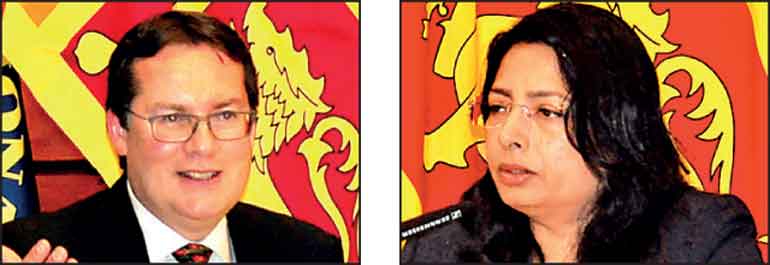Thursday Feb 26, 2026
Thursday Feb 26, 2026
Saturday, 20 January 2024 01:34 - - {{hitsCtrl.values.hits}}

IMF mission team leader Peter Breuer (left) at the media briefing in Colombo yesterday along with Resident Representative in Sri Lanka Sarwat Jahan – Pix by Sameera Wijesinghe
The International Monetary Fund (IMF) yesterday declared that Sri Lanka is yielding first signs of recovery but stressed the need to persist with the economic reform program to fully emerge from the crisis benefitting the people.
“The economic reform program implemented by the Sri Lankan authorities is yielding the first signs of recovery. Real GDP recorded positive growth of 1.6% year-on-year in the third quarter of 2023, the first expansion in six consecutive quarters,” the IMF’s mission team leader Peter Breuer said.
Speaking to journalists in Colombo along with Resident Representative in Sri Lanka Sarwat Jahan following the conclusion of the latest staff visit from 11 to 19 January, Breuer also cited low inflation, increased revenue collection, and a build-up of external reserves as other indicators to substantiate the IMF’s assessment of initial signs of recovery.
“Shortages of essentials have eased, and inflation remains contained. Gross international reserves increased by $ 2.5 billion during 2023, and preliminary data point to improved fiscal revenue collections during the fourth quarter of 2023,” he added.
The IMF mission was in the country to discuss recent macroeconomic developments and progress in implementing economic and financial policies under its $ 3 billion four-year Extended Fund Facility (EFF) arrangement.
Whilst commending the progress thus far, the IMF stressed that staying the course on the reform agenda is necessary for the recent stabilisation to evolve into broad-based and stable growth that will ensure a full and lasting economic recovery benefitting the people.
Breuer said the progress in meeting key commitments under the IMF-supported program will be formally assessed in the context of the second review of the EFF arrangement in June alongside the forthcoming 2024 Article IV consultation assessing Sri Lanka’s economic health. Under the IMF program, Sri Lanka has so far received $ 670 million under two tranches since March 2023.
Breuer stressed that sustaining the reform momentum and ensuring timely implementation of all program commitments are critical to rebuilding confidence and putting the recovery on a firm footing that will benefit all people.
IMF also called for swift progress towards the introduction of a progressive property tax is key to ensuring fair burden sharing while sustaining the revenue-based consolidation.
“Tax policy measures need to be accompanied by strengthening tax administration, removing tax exemptions, and actively eliminating tax evasion to make the reforms more sustainable and to further build confidence among creditors to support Sri Lanka’s efforts to regain debt sustainability,” Breuer added.
With regard to the need to further consolidate the Central Bank of Sri Lanka’s success in taming inflation, IMF said future monetary policy decisions should remain prudent with a focus on keeping inflation expectations well anchored. “Against continued uncertainty, it remains important to continue rebuilding external buffers through strong reserve accumulation. Protecting the poor and the vulnerable through improved targeting and better coverage of cash transfers remains critical.”
Breuer also said that to safeguard the stability of the financial sector and bolster its capacity to support economic growth, the authorities need to urgently finalise amendments to the Banking Act in line with their commitment under the IMF-supported program, implement the bank recapitalisation plan and strengthen the financial supervision and crisis management framework.
Following the publication of the IMF Governance Diagnostic report, Breuer said it is now imperative for the authorities to adopt their own action plan for implementing the recommendations in the report beyond the priority commitments under the EFF arrangement. “At the same time, ensuring an enabling environment for governance and transparency reforms to take place is key to bolstering public confidence and facilitating implementation of these important efforts,” he stressed.
Noting that the authorities have made commendable progress with putting debt on a path towards sustainability, the IMF said the execution of the domestic debt restructuring was an important milestone.
“A swift completion of final agreements with official creditors and reaching a resolution with external private creditors remain critical. Progress in meeting key commitments under the IMF-supported program will be formally assessed in the context of the second review of the EFF arrangement alongside the forthcoming 2024 Article IV consultation assessing Sri Lanka’s economic health,” he added.
During the visit, the IMF team held meetings with the President and Finance Minister Ranil Wickremesinghe, Central Bank Governor Dr. P. Nandalal Weerasinghe, Speaker of Parliament Mahinda Yapa Abeywardana, Ministers Kanchana Wijesekera and Wijeyadasa Rajapakse, State Minister Shehan Semasinghe, Secretary to the Treasury Mahinda Siriwardana, Governor of Northern Province P.S.M. Charles, Governor of Eastern Province Senthil Thondaman, and other senior Government and CBSL officials. The IMF team also met with Parliamentarians, representatives from the private sector, civil society organisations, and development partners.
“We would like to thank the authorities for the excellent collaboration during the mission, including during the mission’s visit to the Northern and Eastern provinces. This visit enriched the mission team’s understanding of the challenges as well as the potential of Sri Lanka. We reaffirm our commitment to support Sri Lanka for a full economic recovery from the crisis,” Breuer added.